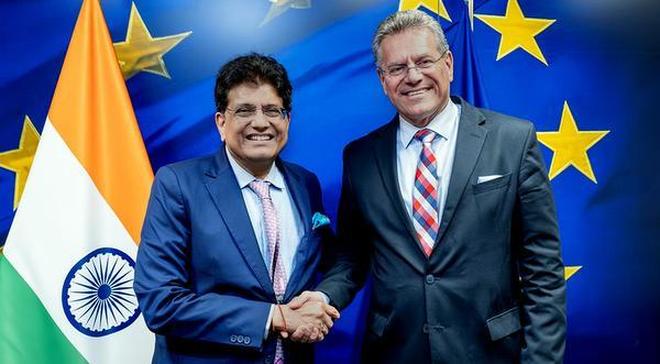Trade talks: Delhi focussed on getting its concerns on EU regulations addressed


European Union and India flag together realtions textile cloth fabric texture
| Photo Credit:
Oleksii Liskonih
India is focussed on getting its concerns on EU regulations such as the carbon border adjustment mechanism (CBAM) and the EU Deforestation Regulation (EUDR) addressed as part of the bilateral Free Trade Agreement being negotiated even as the two sides aim for substantial conclusion of the negotiations by the year-end.
EU negotiators are in Delhi this week to take forward the talks as a follow-up to Commerce Minister Piyush Goyal’s recent Brussels visit. New Delhi wants its concerns on all standards related measures to be addressed as these could take away parts of the FTA benefits once implemented.
“A senior team of negotiators from the EU is in New Delhi from November 3-7 for negotiations with Indian counterparts on the proposed India–EU FTA. The engagements aim to resolve key outstanding issues and advance the agreement toward a balanced and equitable framework that benefits both sides,” per a statement issued by the Commerce Department.
Goyal was in Brussels on October 27-28 where he held discussions with European Commissioner for Trade and Economic Security Maroš Šefčovič to intensify engagement and facilitate a comprehensive trade agreement.

Union Minister of Commerce and Industry Piyush Goyal met EU Commissioner for Trade and Economic Security Maros Sefcovic, in Brussels on Monday
| Photo Credit: .@PiyushGoyal X/ANI Photo
As part of the EU team visit, Sabine Weyand, Director-General for Trade at the European Commission will be in New Delhi on November 5-6 for high-level talks with India’s Commerce Secretary Shri. Rajesh Aggarwal on key technical and policy issues.
Although almost half the chapters of the proposed FTA have been agreed upon, the last leg of the talks continue to be tough especially as India’s concerns on EU regulations such as CBAM, EUDR and requirement for a “digital product passport” for many exports need to be ironed out, a source tracking the matter said.
The EU’s CBAM regulation, under which it seeks to levy a carbon tax on identified goods being shipped from other countries. is a big worry for India. Under CBAM, Indian exports of steel, aluminium, and cement to the EU could face tariffs of 20-35 per cent from next year, per calculations made by research body GTRI.
The EU Deforestation Regulation (EUDR), which comes into play from December 30, 2025, for large and medium-size companies, and from June 30, 2026, for small enterprises, could hurt agriculture exports from India. Its implementation requires companies to prove that their products, including commodities like cattle, coffee, cocoa, oil palm, rubber, soy, and wood, are deforestation-free and legally produced.
Another regulation that has worried Indian exporters, especially of garments, is the bloc’s Ecodesign for Sustainable Products Regulation (ESPR). This covers a wider range of products including textiles, furniture, iron, steel, etc, and introduces a digital product passport requiring a QR code with detailed sustainability and traceability information from January 2026.
“The FTA with the EU will take away a large part of gains that India would negotiate in terms of market access for its goods if the stringent regulations are not addressed,” the source said.
Published on November 4, 2025


